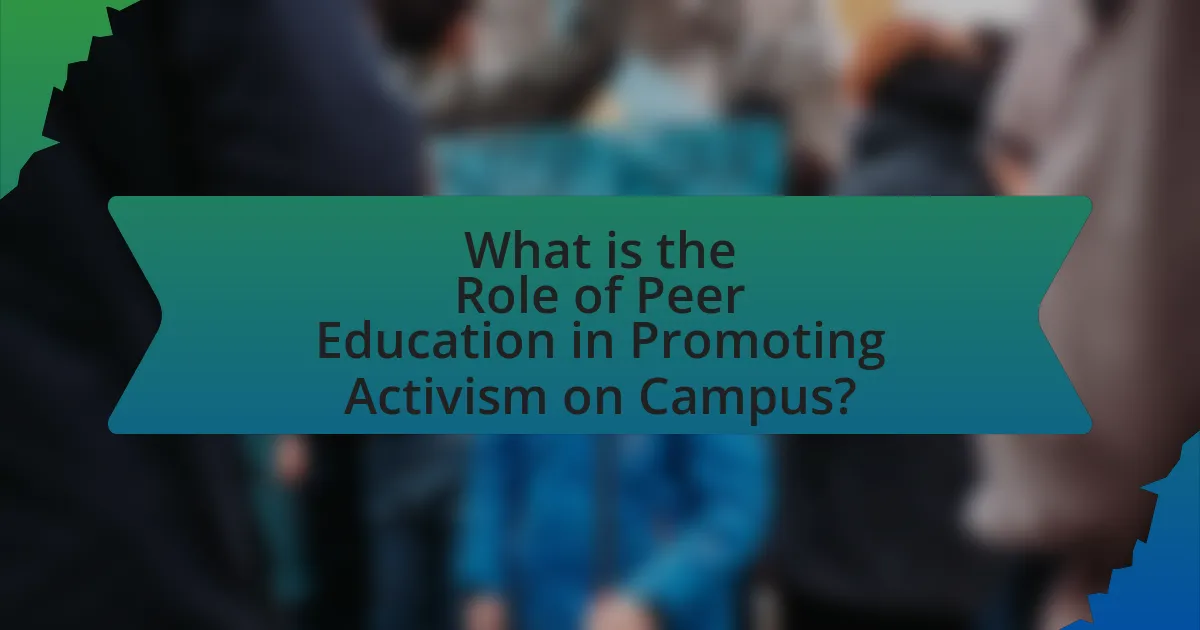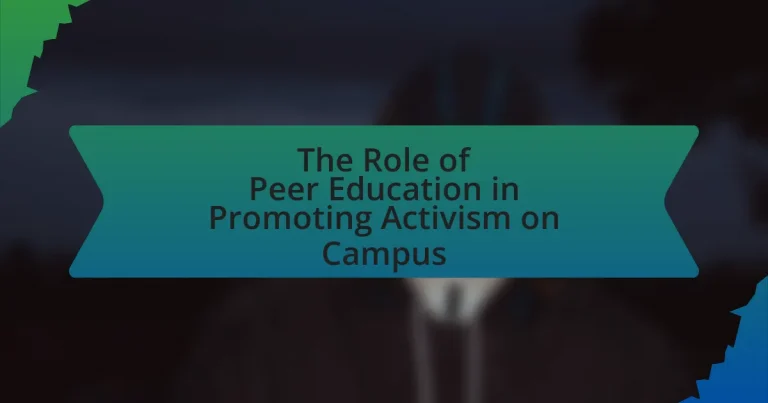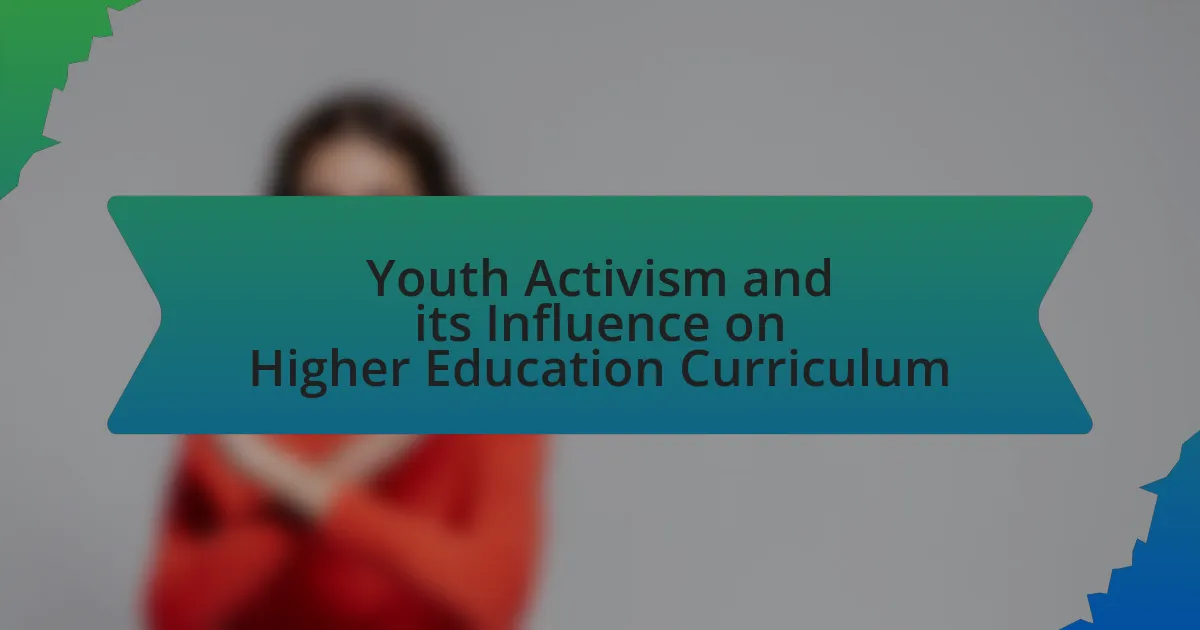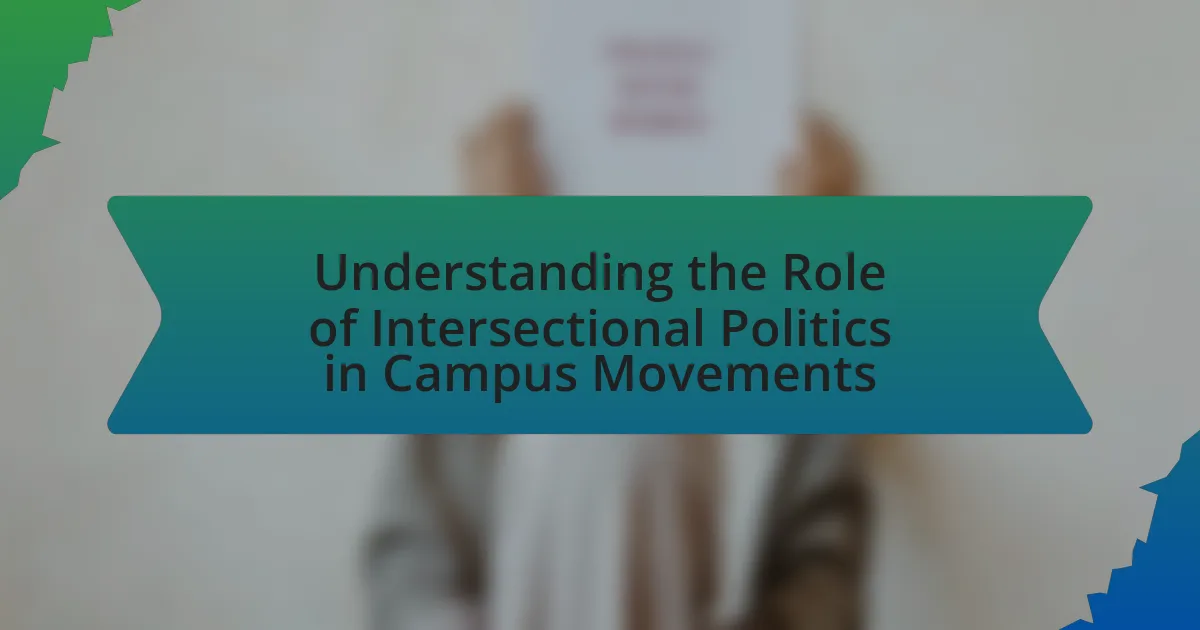Peer education is a vital mechanism for promoting activism on college campuses, empowering students to engage with social issues through relatable and accessible methods. This article explores how peer-led initiatives enhance student participation in activism by fostering community, trust, and dialogue. It examines the effectiveness of various strategies employed by peer educators, such as workshops and social media campaigns, while also addressing the challenges they face, including lack of institutional support and resistance from peers. Additionally, the article highlights the unique perspectives peer educators bring to activism and discusses future trends in peer education and campus activism, emphasizing the role of technology and social media in shaping these efforts.

What is the Role of Peer Education in Promoting Activism on Campus?
Peer education plays a crucial role in promoting activism on campus by empowering students to engage with social issues through relatable and accessible channels. This approach fosters a sense of community and encourages dialogue among peers, making activism more approachable. Research indicates that peer-led initiatives can increase participation in social movements; for instance, a study published in the Journal of Higher Education found that students involved in peer education programs were 30% more likely to participate in activism compared to those who were not. This effectiveness stems from the trust and rapport established between peers, which enhances the likelihood of students taking action on issues that matter to them.
How does peer education facilitate student engagement in activism?
Peer education facilitates student engagement in activism by creating a supportive environment where students can share experiences and knowledge, fostering a sense of community and empowerment. This approach encourages active participation as peers often relate better to one another than to authority figures, making the information more accessible and relevant. Research indicates that peer-led initiatives can increase students’ confidence and motivation to engage in activism, as seen in programs like the Peer Health Educators at universities, which have shown significant increases in student involvement in social justice campaigns.
What methods do peer educators use to inspire activism among students?
Peer educators inspire activism among students through methods such as workshops, peer-led discussions, and social media campaigns. Workshops provide interactive platforms for students to engage with social issues, fostering critical thinking and encouraging participation in activism. Peer-led discussions create a relatable environment where students can share experiences and ideas, enhancing their commitment to social causes. Social media campaigns leverage platforms popular among students to spread awareness and mobilize support for various initiatives, effectively reaching a wider audience. These methods have been shown to increase student engagement in activism, as evidenced by studies indicating that peer influence significantly impacts students’ willingness to participate in social movements.
How do peer-led initiatives differ from traditional educational approaches?
Peer-led initiatives differ from traditional educational approaches primarily in their structure and delivery method. In peer-led initiatives, learning is facilitated by individuals who are at the same social or educational level as their peers, fostering a more relatable and engaging environment. This contrasts with traditional educational approaches, where knowledge is typically imparted by an authority figure, such as a teacher or professor, creating a hierarchical dynamic. Research indicates that peer-led learning can enhance retention and understanding, as evidenced by a study published in the Journal of Educational Psychology, which found that students participating in peer-led sessions scored significantly higher on assessments compared to those receiving traditional instruction.
Why is peer education important for campus activism?
Peer education is important for campus activism because it fosters a sense of community and empowers students to engage in social issues effectively. By utilizing peers as educators, information is more relatable and accessible, which enhances understanding and encourages participation in activism. Research indicates that peer-led initiatives can increase awareness and motivate action among students, as they often feel more comfortable discussing sensitive topics with their peers. For example, a study published in the Journal of College Student Development found that peer education programs significantly improved students’ knowledge and attitudes towards social justice issues, leading to higher rates of involvement in activism.
What unique perspectives do peer educators bring to activism?
Peer educators bring relatable experiences and insights to activism, enhancing its effectiveness. Their unique perspectives stem from shared backgrounds and challenges with their peers, allowing them to communicate messages in a way that resonates deeply. Research indicates that peer-led initiatives often yield higher engagement rates, as individuals are more likely to respond to messages from those they identify with. For instance, a study published in the Journal of Youth and Adolescence found that peer education programs significantly increased awareness and participation in social issues among students, demonstrating the impact of relatable voices in activism.
How does peer education enhance the effectiveness of activist movements?
Peer education enhances the effectiveness of activist movements by fostering trust and relatability among participants. This approach allows individuals to share experiences and knowledge in a way that resonates more deeply than traditional methods. Research indicates that peer-led initiatives can increase engagement and retention rates; for example, a study published in the Journal of Community Health found that peer education programs improved health knowledge and behaviors among participants by 20% compared to non-peer-led interventions. By leveraging the influence of peers, activist movements can mobilize communities more effectively, leading to greater participation and impact.
What challenges do peer educators face in promoting activism?
Peer educators face several challenges in promoting activism, including lack of institutional support, limited resources, and resistance from peers. Institutional support is often insufficient, which can hinder the effectiveness of their initiatives; for instance, a study by the National Peer Educator Association found that 60% of peer educators reported inadequate backing from their institutions. Limited resources, such as funding and materials, restrict their ability to organize events and outreach programs effectively. Additionally, peer educators frequently encounter resistance from their peers, who may be apathetic or skeptical about activism, making it difficult to engage them in meaningful discussions or actions. These challenges collectively impede the ability of peer educators to foster a vibrant culture of activism on campus.
What barriers exist for peer educators in engaging their peers?
Barriers for peer educators in engaging their peers include lack of trust, perceived authority differences, and insufficient training. Peer educators often struggle to establish credibility among their peers, as individuals may question their expertise or motivations. Additionally, the dynamics of peer relationships can create discomfort, making it challenging for educators to approach sensitive topics. Research indicates that effective peer education requires comprehensive training to equip educators with the skills necessary to facilitate discussions and address concerns, yet many programs do not provide adequate preparation. This lack of support can hinder the effectiveness of peer educators in fostering meaningful engagement.
How can peer educators overcome these challenges?
Peer educators can overcome challenges by implementing structured training programs that enhance their skills and knowledge. These programs can focus on communication, conflict resolution, and cultural competency, which are essential for effectively engaging diverse student populations. Research indicates that well-trained peer educators are more confident and capable in their roles, leading to increased effectiveness in promoting activism on campus. For instance, a study published in the Journal of Peer Education found that peer educators who underwent comprehensive training reported a 30% increase in their ability to address peer concerns and facilitate discussions on activism-related topics.
How does peer education impact the overall campus culture?
Peer education significantly enhances campus culture by fostering a sense of community and encouraging active participation among students. This approach empowers individuals to share knowledge and experiences, leading to increased awareness of social issues and promoting a culture of inclusivity and support. Research indicates that peer-led initiatives can improve student engagement, with studies showing that campuses with active peer education programs report higher levels of student satisfaction and involvement in extracurricular activities. For instance, a study published in the Journal of College Student Development found that peer education programs positively correlated with increased student retention rates and a stronger sense of belonging on campus.
What strategies can enhance the effectiveness of peer education in activism?
To enhance the effectiveness of peer education in activism, implementing structured training programs for peer educators is essential. These programs should focus on developing communication skills, understanding social issues, and fostering critical thinking. Research indicates that well-trained peer educators can significantly increase engagement and knowledge retention among their peers, as evidenced by a study published in the Journal of Higher Education Outreach and Engagement, which found that structured peer education initiatives led to a 30% increase in participant awareness of social justice issues. Additionally, creating a supportive community among peer educators encourages collaboration and sharing of best practices, further amplifying their impact in activism.
What best practices should peer educators follow to maximize their impact?
Peer educators should engage in active listening, build trust, and provide accurate information to maximize their impact. Active listening allows peer educators to understand the needs and concerns of their peers, fostering a supportive environment. Building trust encourages open communication, making peers more likely to seek guidance and share their experiences. Providing accurate information ensures that peers receive reliable guidance, which is crucial for effective education and activism. Research indicates that peer-led initiatives can increase knowledge retention and behavioral change, highlighting the effectiveness of these best practices in promoting activism on campus.
How can peer education programs be evaluated for success?
Peer education programs can be evaluated for success through a combination of quantitative and qualitative metrics. Quantitative metrics include pre- and post-program surveys that measure changes in knowledge, attitudes, and behaviors among participants, with studies indicating that such evaluations can show significant improvements; for example, a study published in the Journal of American College Health found that peer-led programs increased knowledge about health topics by 30%. Qualitative metrics involve focus groups and interviews that gather participants’ feedback on their experiences and perceived impact, providing insights into the program’s effectiveness and areas for improvement. Additionally, tracking participation rates and retention can also serve as indicators of success, as higher engagement often correlates with positive outcomes.
What are the future trends in peer education and campus activism?
Future trends in peer education and campus activism include increased digital engagement, intersectionality in activism, and a focus on mental health awareness. Digital platforms are becoming essential for peer educators to reach wider audiences, facilitating virtual workshops and discussions that enhance participation. Additionally, activism is increasingly recognizing the importance of intersectionality, addressing multiple identities and experiences to create inclusive movements. Mental health awareness is also gaining prominence, with peer education programs focusing on emotional well-being as a critical component of activism, reflecting a broader societal shift towards holistic health. These trends are supported by studies indicating that digital tools enhance engagement and that inclusive practices lead to more effective activism.
How is technology shaping peer education initiatives?
Technology is significantly shaping peer education initiatives by enhancing communication, accessibility, and engagement among participants. Digital platforms, such as social media and online forums, facilitate real-time interaction and information sharing, allowing peer educators to connect with a broader audience. For instance, a study by the Journal of Peer Learning found that 85% of students reported increased engagement in peer-led programs when technology was utilized for outreach and collaboration. Additionally, mobile applications and online resources provide easy access to educational materials, making it simpler for peers to learn and share knowledge. This integration of technology not only streamlines the educational process but also fosters a more inclusive environment for diverse student populations.
What role will social media play in future activism efforts?
Social media will serve as a crucial platform for future activism efforts by facilitating rapid communication and mobilization among activists. It enables the dissemination of information, organization of events, and amplification of marginalized voices, which has been evidenced by movements such as Black Lives Matter and the global climate strikes. According to a 2020 study published in the Journal of Communication, 79% of activists reported that social media was essential for their organizing efforts, highlighting its role in reaching wider audiences and fostering community engagement.
What practical tips can peer educators use to promote activism effectively?
Peer educators can promote activism effectively by engaging their peers through interactive workshops and discussions that foster critical thinking and awareness of social issues. Research indicates that participatory learning methods enhance retention and motivation, making peers more likely to take action (Freire, 1970). Additionally, utilizing social media platforms to share information and mobilize support can amplify their reach, as studies show that online activism can significantly increase participation in real-world events (Boulianne, 2015). Lastly, collaborating with established organizations can provide resources and credibility, further encouraging peers to get involved in activism initiatives.




